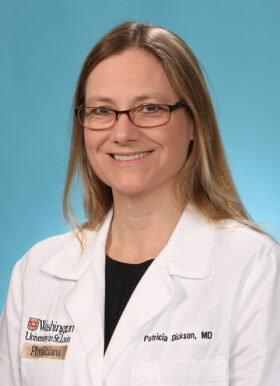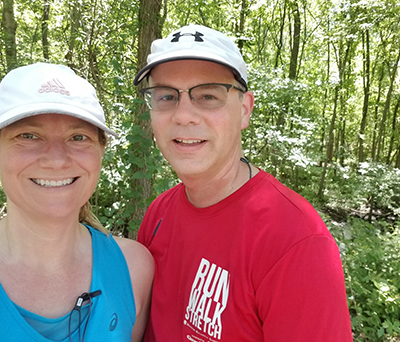Patricia Dickson, MD

Patricia Dickson, MD, is a geneticist who specializes in medical genetics, dysmorphology and inborn errors of metabolism.
Dr. Dickson sees patients at:
- St. Louis Children’s Hospital
1 Children’s Place, Suite 2C
St. Louis, MO 63110
- St. Louis Children’s Specialty Care Center – South County
5114 Midamerica Plaza, Suite 3A
St. Louis, MO 63129
- Pediatric Specialists Outreach Clinic
1723 Broadway Street, Suite 120
Cape Girardeau, MO 63701
PLEASE CALL 314-454-6093 FOR AN APPOINTMENT.
What happened in the course of schooling to influence you to choose your specialty of medical genetics?
If you had asked me as a kid what I was going to be when I grew up, my answer was usually cosmologist (study of the cosmos), but occasionally I would say geneticist. I never had many opportunities to think about genetics or have any experience with genetics. It wasn’t until I was completing my pediatric residency (and had no idea what I wanted to do) when my department chair, who was a medical geneticist, basically directed me and said, “You are going to do this genetics fellowship.” I did, and never looked back.
What was it about the specialty that captured you?
When I thought about the patients I had seen throughout my training, and which ones stuck with me and had been the most interesting, it was always my genetics patients. I never thought I was smart enough to do genetics, but I applied and was accepted into the fellowship. It wasn’t until I met a family in my research interests for mucopolysaccharidosis (MPS) that it became a calling to work on MPS and to be a geneticist. It’s been an absolutely fantastic ride and the greatest choice I could have made.

Can you explain mucopolysaccharidosis (MPS)?
Patients with MPS are born without a key enzyme. There are different types of MPS, but all are due to the deficiencies of different enzymes. These are enzymes that your body uses to break down materials called glycosaminoglycans that are part of your connective tissue.
If you are missing an enzyme that breaks down glycosaminoglycans, then your body continues to make them and they keep building up. People with MPS store the excess glycosaminoglycans, which causes the disease to get progressively worse throughout their body.
There are ways of adding the missing enzyme back to the body. For example, the enzyme can be made in the laboratory in a recombinant form, and given back to the patient through an intravenous infusion. It’s available for a variety of the different MPS types and it has completely transformed the care and lives of people with this disorder.
What are some symptoms of MPS?
Sometimes signs of MPS can be seen as early as the first year of life, but it is possible that they may not be noticeable until age three years, or older.
The symptoms can include coarsening of facial features, enlargement of liver and spleen. The children tend to have a short stature and can develop hearing loss, airway problems or have recurrent ear infections (but those are common in most children).
But the biggest indication that something is wrong is when a child learns to walk, learns to talk and then gradually loses those skills. That is a big red flag that there might be a genetic problem.
What brought you to Washington University?
I had been collaborating with Dr. Mark Sands in the department of medicine for a number of years. He told me about this position in December 2017. It was a good time in my career to think about moving. I came to visit and saw this was academic medical heaven. I fell in love with the place and the people here. It was a terrific fit.
Which aspect of your practice do you find most interesting?
I can just distill it and say genetics is never boring. It changes so rapidly — what we are doing today is dramatically different than what we were doing 15 years ago. It is almost an unrecognizable practice. What I’ve enjoyed the most is always being challenged, always having something new to do and think about. Those are the biggest reasons to choose genetics.
What new developments in your field are you most excited about?
In 2009 exome sequencing made it possible to sequence all the coding regions of DNA in a patient. They’ve been discovering genes, about 200 new genes a year, for the past five or so years, and discovering that the types of genetic conditions due to those genes can manifest very differently in different people. You can appreciate that it also became very difficult to confirm a diagnosis because there were so many different genes that could underlie it. Obviously, that has changed a lot about how we diagnose conditions.
How do you get a sample for genetic testing?
Most of the genetic testing is now being done by saliva samples or cheek swab samples. This process has made it so much easier, particularly during the pandemic. We are able to evaluate a patient remotely via telehealth and send a DNA kit to the home. The patient’s DNA sample is easily collected via saliva or cheek swab, put into the collection kit and sent back to the lab in a pre-paid envelope. This means that most of the time, the patient doesn’t need to go to a lab for a blood sample.
We are able to provide genetic counseling on telehealth, as well. This has worked out terrifically because the genetic counselors will often prepare a PowerPoint presentation to explain DNA, the change the laboratory found, and how it might affect people in the family.
What is great about this telehealth process is the patient and the family are at home, together in a familiar and comfortable place.
How do patients find you?
Our patients are referred to us through pediatricians, pediatric neurologists, other pediatric specialists or adult specialists — about 20% of our patients are adults.
Many of our adult patients have a personal or family history of cancer, a personal or family history of neurological condition. There are other hereditary problems that we test for – such as Marfan syndrome.
Where are you from?
I’m from New Orleans and my husband is from California. We met in Chicago during college.
Which particular award or achievement is most gratifying?
On a personal level, in 2021 I was elected to the American Society for Clinical Investigation. I don’t have a PhD — so while I’m a physician and do research in the lab and have had publications and grants, I didn’t feel I could call myself a scientist without a PhD.
This is a medical honor society for physician scientists. To have my peers confirm that I am a physician scientist was very gratifying.
Another recent accomplishment is from the National Organization for Rare Disorders (NORD). Can you talk about that?
In November 2021, the National Organization for Rare Disorders (NORD) announced NORD Rare Disease Centers of Excellence across the United States – designating medical centers with high-quality specialized care for rare disease patients. Washington University/BJC Healthcare was designated as one of those 31 NORD Centers of Excellence.
These Centers of Excellence establish a unique network of medical centers, clinics and institutions to advance care and expand access for rare disease patients. Most genetic disorders are rare (the definition of a rare disorder is fewer than 200,000 people in the United States). Genetic disorders are a major underlying factor of many pediatric medical conditions – causing about one third of infant mortality in the United States.
Even though there are many people with genetic disorders and rare disorders, patients struggle to find resources because individually these are very rare. So, while every doctor has seen a rare disorder, there is no doctor who has seen every rare disorder. Patients may struggle to find someone who knows anything about their condition. Having a Center of Excellence is being able to provide a place for patients with rare disorders to find the expertise in their condition.
What is the best advice you’ve received?
I have two answers for this. The first piece of advice was from Dr. Dave Rimoin, who is one of the founders of the American College of Medical Genetics. He once gave a talk where he said “Never be afraid to hire people who are smarter than you.” That was great advice and I have always tried to follow it.
The second piece of advice I received more recently from Dr. Jerome Rotter, a geneticist at Harbor-UCLA. He said “Don’t make decisions out of fear.” That is something I try to remember.
If you weren’t a doctor, what would you like to be doing?
I always wanted to be an astrophysicist or a cosmologist — but I didn’t like my physics courses. So here we are!